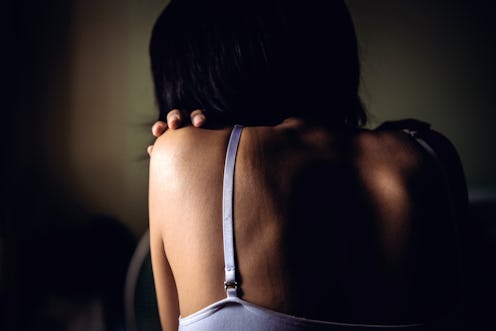News
Reports Of Domestic Abuse Have Risen By 25% During Lockdown, Charities Say

Trigger warning: This article contains references to domestic violence, as do many of its outbound links.
"Stay home, save lives" is a phrase we've heard time and time again since the coronavirus lockdown began. But for individuals locked in with their abusers, staying at home and social distancing is the opposite of staying safe. More than 25 organisations helping domestic violence victims have reported an increase in their caseload, per The Guardian, and now MPs are calling for urgent action.
The Commons Home Affairs Committee warned that without steps to address the issue, "families and communities would be dealing with the devastating consequences for a generation to come," reports Sky News. MPs cited figures gathered by the Counting Dead Women Project, which says 14 women and two children had been killed in the first three weeks of lockdown: the largest number of killings in a three-week period for 11 years, and more than double the average rate.
Meanwhile, The National Domestic Abuse helpline reports a 25% increase in calls and online requests for help in the second week of lockdown, and 49% higher than normal after three weeks, according to Refuge. The UK charity also saw an 150% rise in visits to the website – individuals they believe are seeking information but not making calls – during the last week in February. Separately, global volunteer network CHAYN has also reportedly seen a rise in traffic, trebling last month compared with the same period last year. This is in line with the rise in abuse seen elsewhere in the world as quarantine measures are put in place to curb the spread of coronavirus.
Earlier this month, the Home Office promised an extra £2m to "immediately" help bolster helplines, per BBC. Priti Patel also launched the 'You Are Not Alone' initiative to help victims of domestic abuse.
Last year, 1.6 million women in England and Wales experienced domestic abuse, according to Sandra Horley, chief executive of Refuge, who commented on isolation being a frequent "tool of control" by perpetrators. "While in lockdown or self-isolation, women and children are likely to be spending concentrated periods of time with perpetrators, potentially escalating the threat of domestic abuse and further restricting their freedom," she said.
Domestic abuse, she adds, "isn't always physical: it's a pattern of controlling, threatening and coercive behaviour, which can also be emotional, economic, psychological or sexual."
When schools were closed to everyone except for the children of key workers performing essential services, domestic violence professionals were left off this list. Dawn Butler, Labour’s women and equalities spokeswoman, asked the prime minister to “urgently reconsider” this classification and consider implementing emergency funding to help people in danger escape domestic abuse during the crisis. As it stands, The Department for Education has published a list of “key workers” which does not explicitly include domestic violence professionals, but does include "those essential to the running of the justice system, religious staff, charities and workers delivering key frontline services".
Like other charities helping domestic violence victims, Refuge highlights that social distancing measures leave many more vulnerable to domestic abuse by heightening domestic tensions. Victims are less likely to be able to make an emergency phone call and access escape routes, too. The National Domestic Abuse Helpline – which is still running 24 hours, seven days a week, with staff operating from home – offers the option of seeking help through the website, with a quick exit button which ensures no record of the attempt is left on the phone.
Speaking to the BBC, high-profile campaigner Rachel Williams said she believes domestic violence, and potentially homicides, will escalate as social distancing restrictions in the UK continue.
If you or someone you love have been affected by any of the issues mentioned in this piece, contact Refuge's UK-wide 24-hour helpline on 0808 2000 247 or contact them online via live chat or message. In an emergency, call the Police on 999 and press 55 when prompted if you can't speak.
This article was originally published on